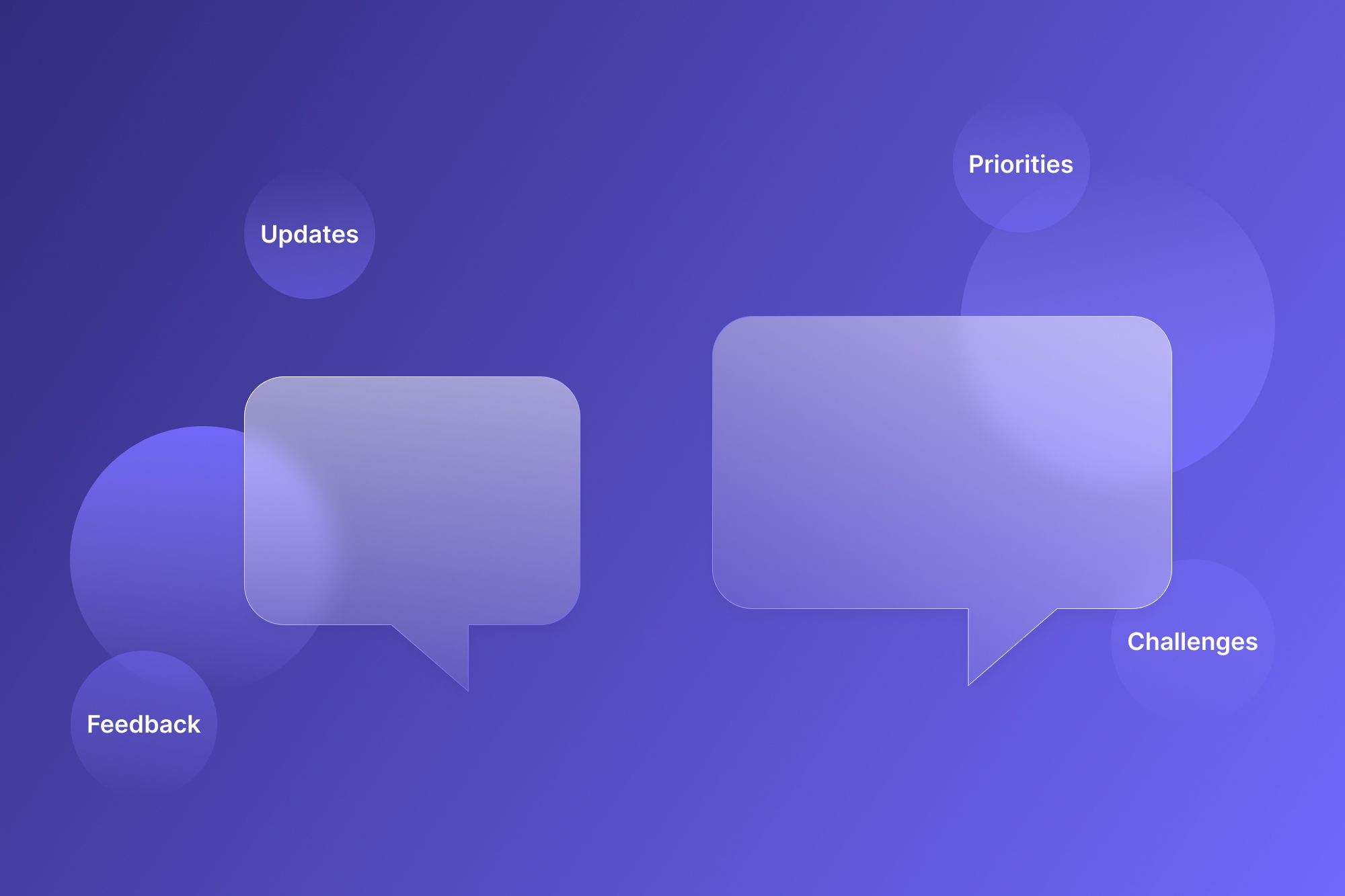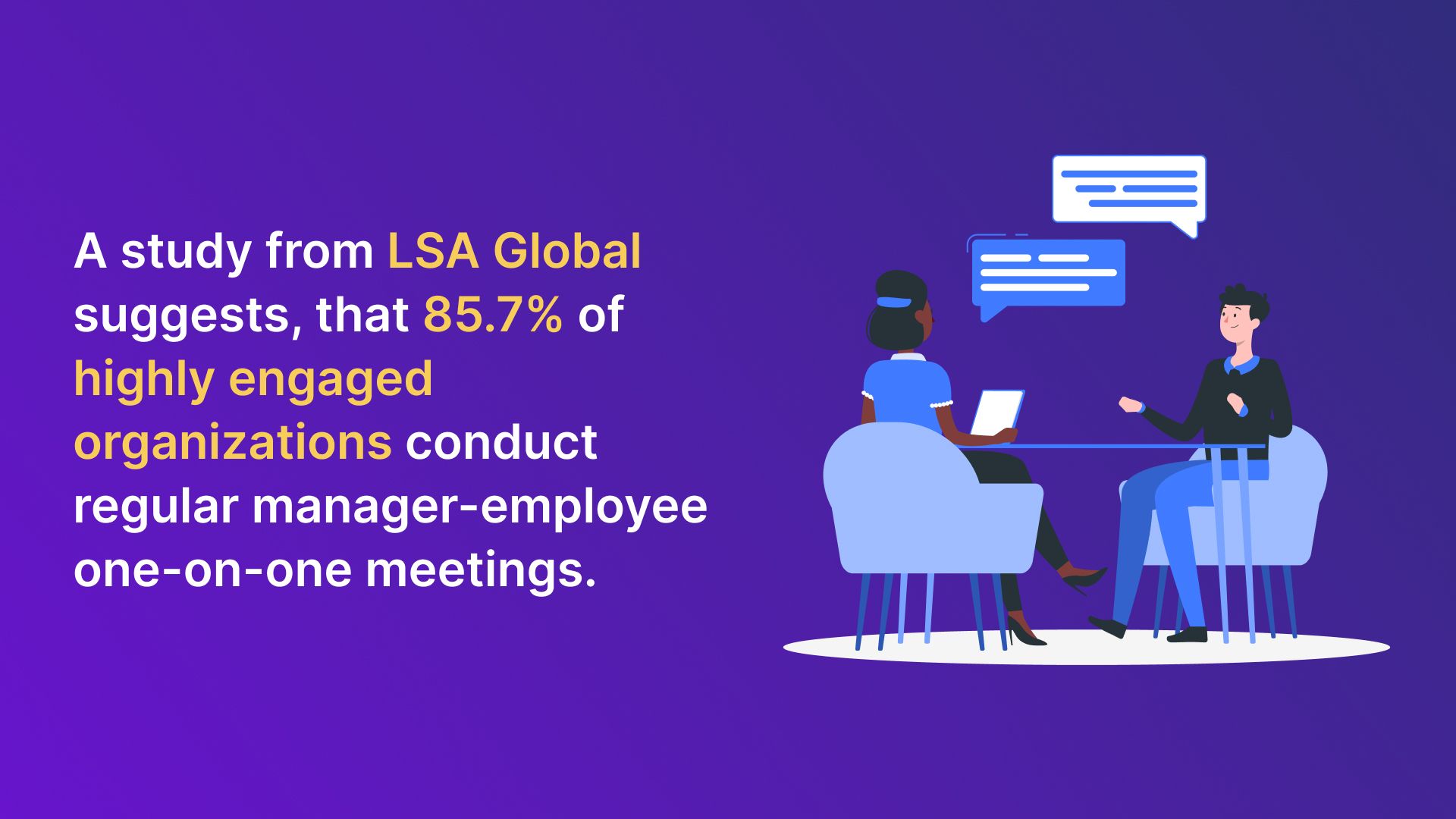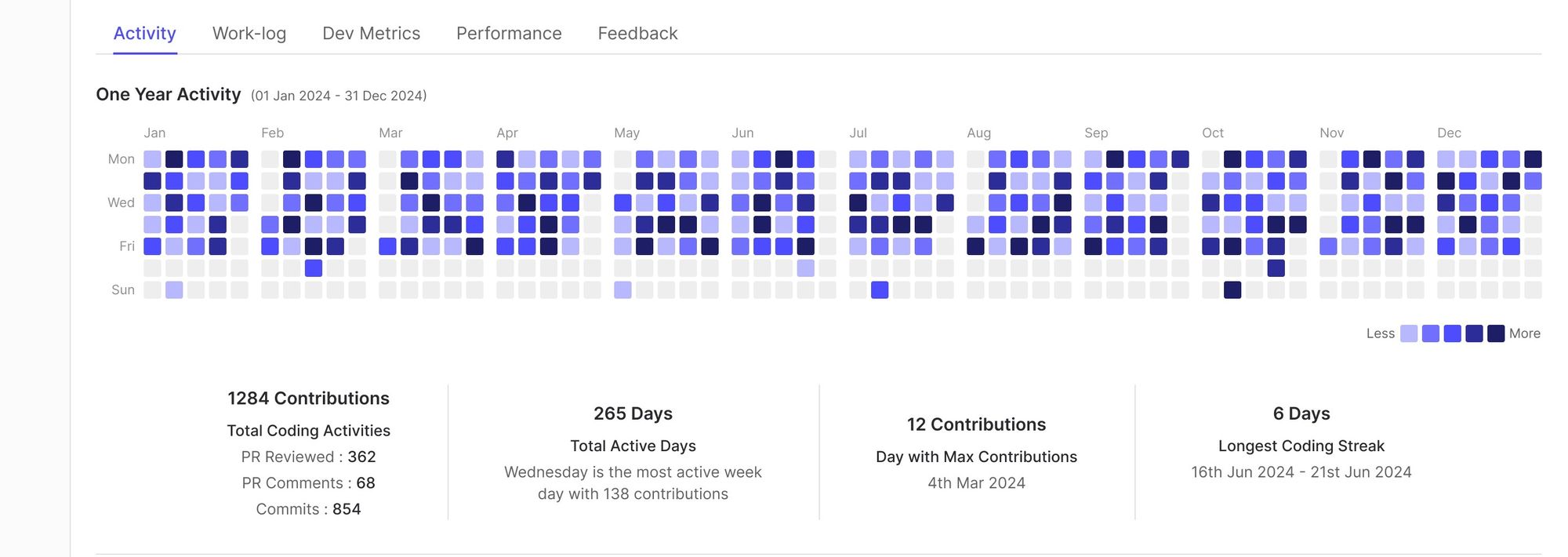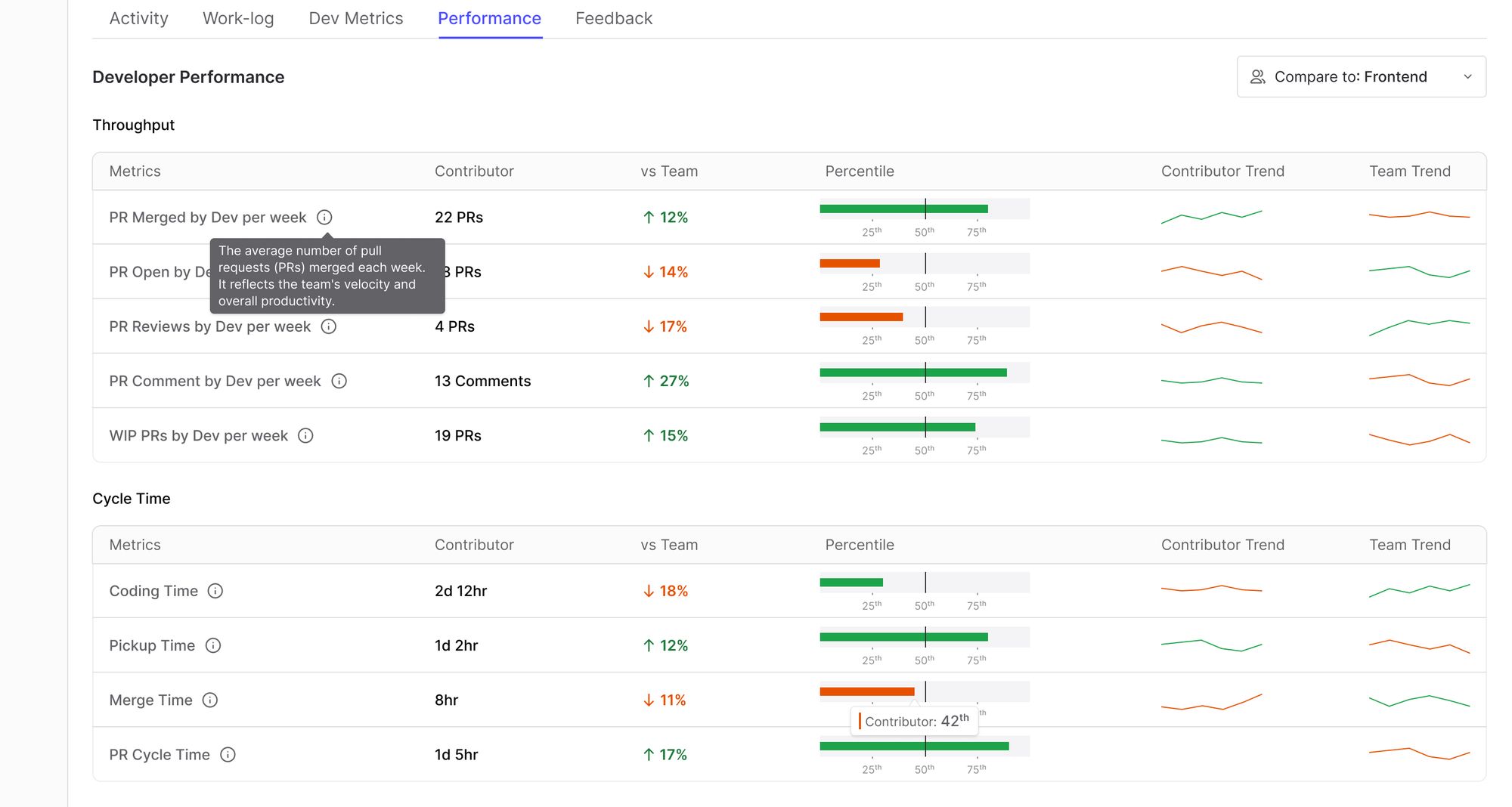How to have effective 1:1 meetings with your engineering team?

Run from it, dread from it, it still arrives! While it sounds like a threatening quote from a Marvel villain, it’s also how most engineers feel about 1:1 meetings. But do they have to be that scary? Well, it’s up to you as an Engineering Manager to make sure your team doesn’t look at 1:1 meetings as the next Babadook and instead feel positive about it.
Let's dive into how to ace those 1:1 meetings with your software engineering team. We'll cover some top tips for making these sessions productive and how to tailor your questions to fit each developer's unique role.
What is The Purpose of 1:1 meetings?
1:1 meetings are fundamental for mutual understanding and growth within a software engineering team. These meetings are primarily focused on feedback – both giving and receiving. They serve as a platform for discussing concerns, setting goals, and charting a path for professional development.
According to Hypercontext, these are the agendas EMs have in mind during 1:1s:
- Growth and development
- Performance
- Employee motivation
- Connection to people/work
- Autonomy and accountability
- Alignment to company missions
Structuring 1:1 meetings as an engineering manager
An excellent way to structure your 1:1 meetings is to follow a simple agenda that covers three main topics:
Updates
This is where you share any relevant information or news that affects your engineer or the team. For example, you can discuss changes in strategy, direction, or priorities; new projects or initiatives; feedback from stakeholders or customers; etc.
Challenges
Discuss problems or difficulties your direct report may face—technical issues, blockers, dependencies, conflicts, etc.
Opportunities
In this case, you can explore any opportunities or possibilities your direct report can pursue or benefit from—for example, learning resources, mentoring programs, hackathons, etc.
It would be best to allocate some time at the end of each meeting for any other topics that your direct report may want to bring up or ask you about. The agenda should not be rigid or fixed; it should be flexible and adaptable to your direct report’s situation and needs.
How to conduct 1:1 meetings for specific roles?
Different strokes for different folks - understanding that each role in software development has its unique challenges and goals is key to effective 1:1 meetings. To truly cater to the diverse needs of your team, it's important to ask direct, role-specific questions. These tailored inquiries not only demonstrate your understanding and appreciation of their contributions but also lead to more meaningful and productive discussions. Let's explore some targeted questions you can use to maximize the effectiveness of your 1:1 meetings:
Front-end developers
Career Development: What new front-end technologies or frameworks are you excited to explore or master?
Workload: How do you balance staying current with emerging front-end trends while managing your day-to-day development tasks?
Innovation: Have you encountered any user interface challenges recently that could lead to innovative solutions or improvements?
Back-end developers
Performance feedback: What recent back-end challenges have you overcome that you feel particularly proud of?
Team dynamics: How effectively do you think our current back-end practices integrate with the front-end development process?
Problem-solving: Are there any recurring technical issues or bottlenecks in our back end that you have ideas to solve?
Full-Stack developers
Career development: Do you find yourself more drawn to front-end or back-end work, and how can we support you in that interest?
Job satisfaction: As a full-stack developer, what aspects of your job do you find the most rewarding, and what can we improve?
Learning: What full-stack projects or technologies would you like to tackle that you believe could contribute to your professional growth?
DevOps engineers
Innovation: Have you come across any new tools or practices in DevOps that you think could benefit our workflow?
Workload management: How are you balancing the operational demands with the need to stay updated on the latest in DevOps?
Collaboration: How can we improve collaboration between the DevOps team and other development teams?
QA engineers
Performance feedback: Can you share a testing challenge you recently encountered and how you resolved it?
Team dynamics: How effective do you find our current testing process in integrating with the overall development cycle?
Innovation: Are there any tools or methods in QA that you think could significantly improve our testing effectiveness?
UI/UX designers
Career development: Are there specific design challenges or projects you would like to focus on to enhance your skills?
Job satisfaction: What elements of the design process do you find most fulfilling, and where do you see room for improvement?
Collaboration: How can we enhance collaboration between the design team and the development team?
Data scientists/engineers
Innovation: What recent advancements in data science do you find exciting and potentially applicable to our projects?
Learning: Are there specific data technologies or methodologies you're interested in exploring to advance your skillset?
Problem Solving: Are there data-related challenges in our current projects where you see opportunities for significant impact?
Security engineers
Performance feedback: What security challenges have you successfully navigated recently that you're proud of?
Team dynamics: How can we better integrate security considerations into our regular development workflows?
Career development: Are there particular areas in cybersecurity you're keen to delve deeper into, and how can we support that?
Site reliability engineers (SREs)
Workload Management: How are you balancing the proactive aspects of SRE (like system improvement) with reactive tasks (like incident response)?
Innovation: Have you identified any patterns or areas in our systems where we can proactively improve reliability?
Collaboration: What can we do to enhance the understanding and collaboration between SREs and the broader engineering team?
General Guidelines For Effective 1:1 Meetings
In addition to role-specific questions, there are universal best practices that are crucial for conducting effective 1:1 conversations with developers. These practices help in creating a constructive, open, and supportive dialogue, essential for the growth and motivation of your team. Let's delve into them:
Ultimate listening
Active listening means paying attention to your direct report’s words, not just hearing them. Engineering managers must demonstrate interest, empathy, and curiosity by asking open-ended questions, reflecting on what they heard, and summarizing key points. Avoiding distractions, interruptions, or judgments during the 1:1s can go a long way in elevating the discussion.
Feedback finesse
Constructive feedback includes specific, actionable, timely insights that help your direct report improve their performance or behavior. Engineering managers must balance positive and negative feedback while dealing with their dev team, praising what they did well and suggesting what they can do better. You can even employ the feedback sandwich technique: start with something positive, give something negative, and end with something positive again.
Proactive support
Enabling your dev engineer to take proactive steps via the 1:1s can help them grow their skills, knowledge, and confidence. First, it means understanding their career goals, interests, and motivations. Once you do that, you can provide your engineers with relevant resources, opportunities, and guidance. Also, you can use the sessions to coach them to solve problems, make decisions, and learn from mistakes. Finally, prioritize challenging them with stretch assignments and feedback loops.
Harmonizing expectations: The SMART Way
Precise alignment involves communicating your expectations and priorities clearly and consistently. Set SMART goals, specific, measurable, achievable, relevant, and time-bound. Then, you must track progress and results regularly and transparently based on these goals.
Keep it Short(er)
Don’t treat 1:1s like a Martin Scorcese movie. The length of 1:1 meetings is crucial for maintaining focus and ensuring they are productive. On average, an effective 1:1 meeting is around 42 minutes long. This duration allows enough time to cover essential topics without overwhelming or exhausting both parties. It's important to keep meetings concise and on-topic. To achieve this, prepare an agenda beforehand and encourage your direct report to do the same. This preparation ensures that all critical points are discussed within the allocated time, making the meeting efficient and respectful of everyone's time.
How often should you have 1:1 meetings?
According to a study, 38% of employees have weekly one-on-one meetings, and 19% have monthly one-on-one sessions. These statistics suggest that one-on-one meetings are becoming more frequent in the post-pandemic world of work. Moreover, a study from LSA Global suggests, that 85.7% of highly engaged organizations conduct regular manager-employee one-on-one meetings.

However, there is no definitive answer to how often you should have 1:1 meetings with your engineers. It depends on various factors, such as:
Your team’s size
The more direct reports you have, the more time you need to dedicate to 1:1 meetings. However, you must also balance your time with other responsibilities and tasks.
The experience level of your engineers
The more junior or new your engineers are, the more guidance and support they may need from you. But avoid micromanaging them.
The nature of your projects
If your project is more complex than your dev team is used to, they may need more guidance and support than usual. It is worth noting that you must also respect your engineers’ workflow and avoid unnecessary interruptions.
Take your meetings to the next level with Developer Profiles by DevDynamics
We’ve all been there scurrying around GitHub, Jira, Slack, and who knows what else, just to find out what your devs have been up to before a 1:1. It’s stressful, and it eats up your time. That’s where DevDynamics’ Developer Profiles swoop in and save the day.

What Makes Developer Profiles a 1:1 Game-Changer?
All Their Work in One Place

- PR cycle times, code quality trends, active days—everything’s right there.
- No more detective work. You open one dashboard, and you’ve got the full story.
Real Data, Real Talk
- Tired of vague feedback like “You need to improve your speed”?
- Instead, point to actual numbers: “Hey, your PR cycle average is two days longer than the rest of the team. Let’s talk about why that might be.”
- That’s how you make feedback feel fair and actionable.
Keep an Eye on Growth Over Time
- 1:1s aren’t just about the week that’s gone by they’re about seeing if your devs are evolving.
- With Developer Profiles, you can track, say, a back-end engineer’s merge times month over month. If you see a spike or a drop, you know exactly what to highlight and discuss.

Highlight Wins You’d Otherwise Miss
- Did someone quietly fix a high-priority bug or do a bunch of thorough code reviews?
- Developer Profiles let you catch those “quiet wins” so you can give credit where it’s due.
How to Weave It into Your 1:1s:
- Before the Meeting: Spend a couple of minutes checking their Profile. Spot any unusual dips or jumps in metrics, note any big achievements.
- Kick Things Off: Start your 1:1 with a quick positive maybe they’re merging PRs faster, or they took on extra code reviews that really helped the team.
- Dig into Challenges: If the Profile shows they’re stuck somewhere (like a bunch of PRs open too long), ask what’s going on. It’s not an accusation; it’s a springboard for problem-solving.
- Set Concrete Goals: Wrap up by picking one or two metrics to focus on—like reducing rework by 10% and agree to revisit in the next 1:1 to see progress.
Why It Matters
When developers feel seen (because you’re referencing actual data and calling out their real work), they’re more likely to engage. 1:1s become less about “Am I doing okay?” and more about “Here’s exactly what I can do to grow.”
And that’s the difference: You’re not just fumbling around with guesswork and scattered notes; you’re showing up with concrete insights that lead to better discussions, real solutions, and a stronger dev team overall.
Ready to shake off the old way of doing 1:1s?
Developer Profiles do the heavy lifting in making your 1:1s data-driven, fair, and super relevant to each developer’s role and challenges. No more guesswork, no more generic feedback, just meaningful, actionable conversations that help your engineers really level up.
If you haven’t checked it out yet, Book a demo with DevDynamics to give Developer Profiles a spin. Prepping for 1:1s has never been easier (or faster).

